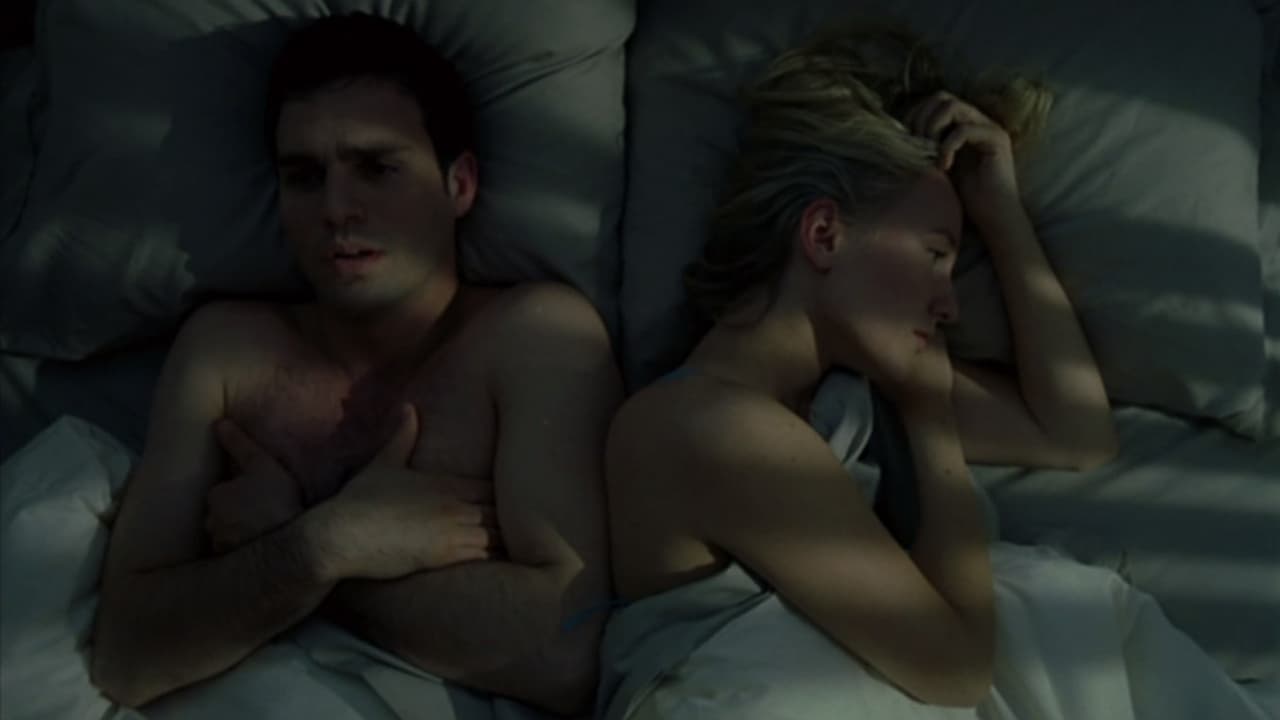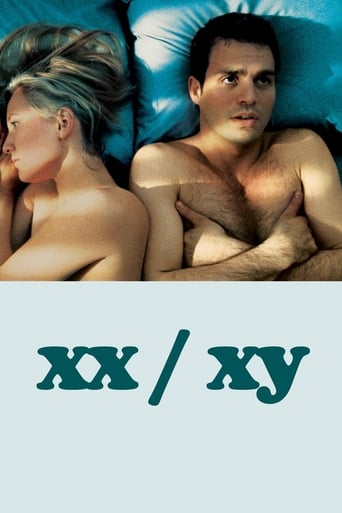

Just so...so bad
... View MoreTrue to its essence, the characters remain on the same line and manage to entertain the viewer, each highlighting their own distinctive qualities or touches.
... View MoreThe story, direction, characters, and writing/dialogue is akin to taking a tranquilizer shot to the neck, but everything else was so well done.
... View More.Like the great film, it's made with a great deal of visible affection both in front of and behind the camera.
... View MorePerhaps the most damning thing you can say about a movie is that it stirs no feelings in you. If you absolutely hate a movie, well at least you feel something. XX/XY denies you even that. There's nothing worth hating. But there's certainly nothing to love either. There's just nothing, an emptiness. The story doesn't engage, the characters inspire no reaction. It's very bland, rather monotonous and sorely lacking in entertainment value.XX/XY is the story of a young man, Coles, played by Mark Ruffalo with a silly mustache. Coles meets young college student Sam. That would be a girl Sam by the way, played by Maya Strange. And Sam has a wild child roommate, Thea, played by Kathleen Robertson. Right after the trio meet they make their way to the bedroom for an exceedingly awkward threesome. They end up in a weird sort of friendship with Coles and Sam a couple and Thea floating around off to the side. And then Coles, who is at heart a jerk, does some jerky things and the whole thing implodes.It is now years later. You can tell it's years later because Coles no longer has a mustache. Now he's in a long-term relationship with a woman named Claire. They're not married but they may as well be, that's the type of relationship they have. And then out of the clear blue sky Sam shows up and you can guess what happens from there. Jerky Coles decides he's wanted Sam all along. Wild child Thea re-enters the picture too, although she's not wild anymore, actually settled down and showing some signs of maturity. Maturity is clearly not something Coles possesses. He acts like a spoiled child and screws things up all over again. Sam's not much better. Poor Claire is there to serve as the aggrieved party, someone for you to feel sorry for. But again this movie really fails to make you feel anything. The key characters are unsympathetic, but not so much so that you can muster up any hate for them. The movie just sits there, nothing grabs you. It's all very predictable, it's not all very entertaining. The best thing you can say about the movie is that the performances are pretty good. It's a fine cast, they just have no material to work with. The focus is on the trio from the first part of the film but if there's any truly memorable moment in the whole film it belongs to Claire. She has a moment where she states the truth about all that has gone on, bluntly and honestly, something nobody else is willing to do. It's a strong moment for the character and for actress Petra Wright. But the movie can't even let us have that moment. It cheapens it, essentially nullifies it, later on by having Claire do something she quite simply should not do. In a smarter, better movie she would do no such thing. Here it's the final unsatisfying piece in an unsatisfying film.
... View MoreAs one of the first of the Baby Boomers (i.e., an old guy) I found it difficult to watch this film about people born in the 1970s and college-educated in the 1990s without forcing myself to make allowances for generational differences.In the early 1960s, college women (then called girls) were still sexually modest and far too unassertive. The college women played by Maya Strange and Kathleen Robertson, Sam and Thea, are recklessly willful and without restraint in sexual matters--the exact opposite of their counterparts 30 years before. As a college man, meanwhile, Mark Ruffalo's character Coles has a certain charm and can be very affectionate but is essentially juvenile in his attitude toward women. As much as he seems to love Sam, nevertheless he has sex with her best friend Thea right before her eyes, as if to deny that his relationship with Sam is anything more than sex play. Thirty years earlier, he would have been regarded by his fellow males as--well, as an asshole.It turns out that in college, Coles was a slacker in training. Ten years later, he is bitter because his dream of a career as a movie-maker went nowhere, and he shows it in his contempt for the people in the ad agency where he works. He has entered the middle class without the responsibility that goes with middle-class living. He has lived for five years with a woman, Claire, who aspires to a grown-up life, with marriage and children, but he is unable to commit to her. They have a nicely furnished and decorated apartment (one imagines this is Claire's handiwork), and he has cleaned himself up a bit, but he is essentially the same feckless boy-man that he was in school. His perennial uniform continues to be the tee-shirt.No surprise that when Sam re-enters his life, it is not long before we are once again looking at Mark Ruffalo's buttocks as he has sex with Sam. Unfortunately, the worthy Claire accidentally happens upon the same scene.At the end, Sam marries someone else in haste, running away from the trouble that is sure to befall anyone who forms a relationship with the juvenile Coles. And Claire decides to give Coles another chance in order to salvage her five years with him and in hopes of having a permanent home and children. One doubts that she will be happy in the long run.Ultimately, Sam and Thea have at least made an attempt to lead grown-up lives,but Coles remains the same boy-man that he was in college. I expect that many Generation X women will not find this surprising.
... View MoreThis is a story about the high personal cost of indecision. The story unfolds slowly, but this is necessary to develop the characters fully so that we can come to understand their wants and needs firsthand. Coles (Mark Ruffalo) is an artist who can't seem to make a real decision in his life and, as a result, eventually loses the only woman he ever really loved to another, more decisive man. He learns too late that "no decision is a decision". The viewer, likewise, does not realize in the beginning that Coles' indecisiveness is going to hurt him badly, and others too, since he seems to recover well several times from his errors in judgment concerning his love life. He is a lovable young man and, Sam, the woman he meets and falls in love with, forgives and forgets his many mistakes in their relationship, until one day she has been hurt too much and leaves his life for several years. Coles goes on with his life and begins living with another woman, Claire, whom he seems to love. But when Sam returns years later and bumps into him, their love for each other reignites with its original passion, and he is faced with a crucial decision: choose Sam and break off his seemingly strong relationship with Claire, or stay with Claire and let Sam go on with her life. Again, he cannot make a decision, and so circumstances decide his fate, rather than he himself. Not only does he lose Sam and a future with her (she marries a man named Jonathon suddenly), but he also loses Claire's love and respect, since Claire figures out that he loves Sam. The viewer can feel Coles' agony when he discovers that Sam has gotten married and may even pity him, but at the same time the viewer cannot ignore that Coles chose this outcome for himself simply by not choosing any other outcome.
... View MoreFrom many comments about this film and the similar Closer, one would think all the characters were reckless libertine hedonists. They're not, they're unsuccessful serial monogamists like most of us in the modern western world. This one doesn't have the Oscar Wilde/Noel Coward wit or shocking vulgarity of Closer, but it does have amazing true-to-life performances, especially from Petra Wright (who has an aristocratic beauty similar to Mimi Rogers in Someone to Watch Over Me), Kathleen Robertson, who previously had a field day as an innocent bigamist in Gregg Araki's Splendor, Maya Strange (not Strange), who displays a vulnerability much like Natasha Gregson Wagner in some other independent films (what happened to her?). And of course Mark Ruffalo, an undecided everyman for our times, like the dog in Aesop who loses his bone because he thinks he sees a better one. And as someone remarked, this is definitely Eric Rohmer territory. Excellent writing, cinematography, and use of music, and not one redundant line or wasted shot.
... View More